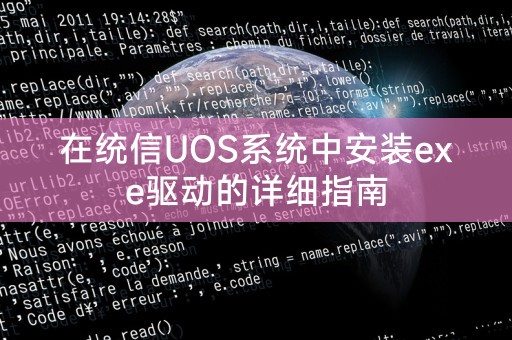Home >System Tutorial >LINUX >Detailed guide for installing exe driver in Tongxin UOS system
Detailed guide for installing exe driver in Tongxin UOS system
- 王林forward
- 2024-02-11 10:45:211912browse
php editor Apple has brought you a detailed guide on installing the exe driver in the Tongxin UOS system. Tongxin UOS system is a Linux-based operating system. Although it does not support direct installation of exe drivers, we can install it through some techniques. In this guide, we will introduce you in detail how to prepare and install the necessary software, and provide step-by-step instructions to help you successfully complete the installation of the exe driver. Whether you are a newbie or an experienced user, this guide will provide you with useful information and guidance to make the installation process a breeze.

Using Wine software
Wine is a compatibility layer that can run Windows applications on Linux. By installing Wine, you can run Windows applications on Tongxin UOS system Run the exe file and install the driver.
1. Open the terminal and use the following command to install Wine:
```
sudo apt update
sudo apt install wine
2. Download the exe driver file to be installed and save it locally.
3. Navigate to the directory where the exe file is saved in the terminal.
4. Use the following command to run the exe file:
```arduino
wine
This will start the exe file and try to run the Tongxin UOS system Please note that some exe files may not run properly or install drivers in Wine.
Use a virtual machine
Another way to install the exe driver in the Tongxin UOS system is to use a virtual machine. You can run the Windows system in the virtual machine and install the exe driver in it. program.
1. Download and install virtual machine software, such as VirtualBox or VMware.
2. Create a new virtual machine and select Windows as the operating system.
3. Install the Windows system in the virtual machine and ensure the network connection with the Tongxin UOS system.
4. Access the exe driver in Windows system and install it according to the normal process.
5. After the installation is complete, you can run the Windows system in the virtual machine and use the exe driver.
It should be noted that using virtual machines requires additional hardware resources, and setting up and managing virtual machines may require some experience. If you are not familiar with the use of virtual machines, please refer to relevant documents or tutorials.
Seeking other solutions
If you cannot install the exe driver in the Tongxin UOS system through Wine or a virtual machine, you can consider the following other solutions:
1 . Find alternative drivers for Linux: Some drivers may have been optimized and ported for Linux. You can search relevant communities and forums to find out if there are alternative drivers for Linux that can be downloaded and installed.
2. Use Linux drivers provided by hardware manufacturers: Some hardware manufacturers will provide drivers suitable for Linux. You can visit the official website or documentation of the hardware manufacturer to find out whether there is a Linux driver suitable for your device. Drivers are available for download and installation.
3. Use third-party package managers: Some Linux distributions provide third-party package managers, which can easily install and manage software packages. You can try to use these package managers to search and Install the exe driver. On Debian or Ubuntu systems, you can use apt-get or aptitude to install the package.
It should be noted that different hardware devices and drivers may require different solutions. Before trying the above solutions, please make sure you understand the specific requirements and limitations of your device and driver.
Installing exe drivers in Tongxin UOS system is a relatively complicated process, but by using Wine software, virtual machines or other solutions, you can achieve this goal. Before trying these methods, please make sure You understand the specific requirements and limitations of your device and drivers and choose the method that works best for you based on the actual situation.
The above is the detailed content of Detailed guide for installing exe driver in Tongxin UOS system. For more information, please follow other related articles on the PHP Chinese website!
Related articles
See more- Is Tongxin uos suitable for old computers?
- Tongxin uos batch installation guide: efficient deployment and easy management
- Xiaosi LINUX shares: Detailed guide to installing files in Tongxin UOS system
- Install Tongxin uos on mac and install Tongxin system on Mac
- Installation of DEB package and command line operation guide in Tongxin UOS

